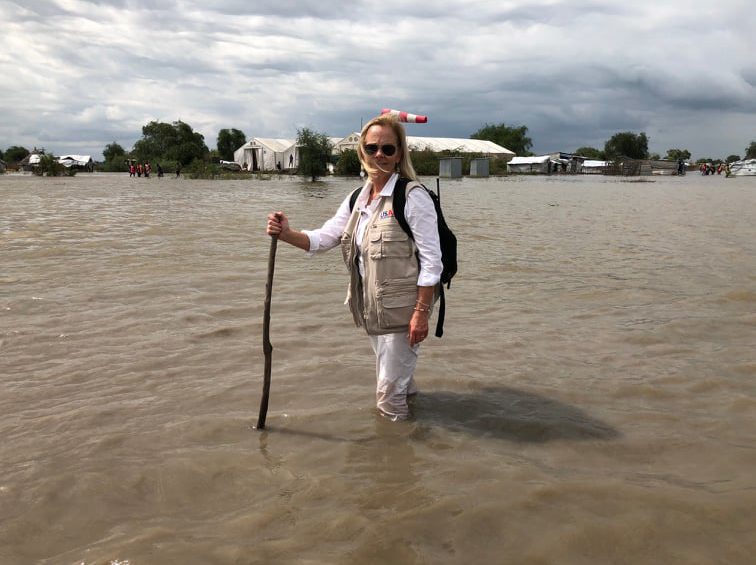You are here: Home | Humanitarian | National News | News | Experts blame extreme weather for E. Africa’s food woes

USAID Mission Director Leslie Reed wades through flood waters during a visit to Pibor on Nov 6, 2019 | Credit | USAID.
The Intergovernmental Authority on Development says extreme weather conditions in 2019 are to blame for the acute food insecurity for 13.2 million people in the East African region.
According to a 2020 food crisis report published by IGAD, hungry people in Kenya, Ethiopia, South Sudan, Sudan, Somalia, and Uganda, constitute 22 percent of 135 million Africans who faced acute food insecurity in 2019.
The IGAD report released on Wednesday shows that heavy rainfall across East Africa from April has caused severe flooding and landslides.
This, according to the report has led to the displacement of people, damaged homes, property, crops, pastures and public infrastructure and further disrupting livelihoods and in some cases leading to death.
It warned that the ongoing floods will worsen the situation especially at a time when the region is facing multiple crises including desert locust invasion, Covid-19 pandemic, economic retardations, and insecurity.
“By mid-May, many weather stations had recorded their highest amounts of rainfall in over 40 years, and flooding areas were still recovering from the October–December 2019 floods,” the report said.
According to the UN-Office for the Coordination of Humanitarian Affairs, floods have affected over 1.3 million people across the East Africa region between March and mid-May 2020.
Somalia, Kenya, Ethiopia, Djibouti, and Uganda are the most affected.
In Uganda, Lake Victoria, Albert, and Kyoga have surpassed their previous record highs, according to authorities, thereby displacing communities close to shorelines and river banks.
In South Sudan, the populations in Jonglei State are already facing floods yet the country’s first rainy season has just started.
The World Food Program says over 702 square kilometers of cropland had been washed away or buried by floods across the affected countries in East Africa by early May.
It says floods were already disrupting the supply and access to food and essential non-food commodities.
Support Eye Radio, the first independent radio broadcaster of news, information & entertainment in South Sudan.
Make a monthly or a one off contribution.
Copyright 2024. All rights reserved. Eye Radio is a product of Eye Media Limited.